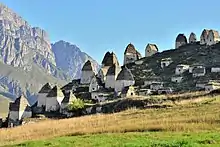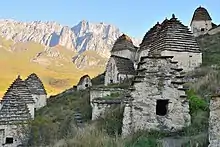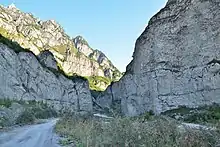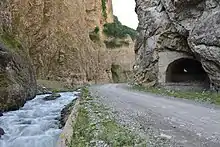Prigorodny District
Пригородный район | |
|---|---|
| Other transcription(s) | |
| • Ossetian | Горæтгæроны район |
| • Ingush | ГӀалме Шахьар |
 Kolka-Karmadon rock ice slide in Prigorodny District | |
Location of Prigorodny District in the Republic of North Ossetia–Alania | |
| Coordinates: 43°03′37″N 44°44′06″E / 43.06028°N 44.73500°E | |
| Country | Russia |
| Federal subject | Republic of North Ossetia–Alania[1] |
| Administrative center | Oktyabrskoye[1] |
| Area | |
| • Total | 1,460 km2 (560 sq mi) |
| Population | |
| • Total | 108,665 |
| • Estimate (2018)[3] | 103,132 (−5.1%) |
| • Density | 74/km2 (190/sq mi) |
| • Urban | 0% |
| • Rural | 100% |
| Administrative structure | |
| • Administrative divisions | 19 rural okrug |
| • Inhabited localities[1] | 31 Rural localities |
| Municipal structure | |
| • Municipally incorporated as | Prigorodny Municipal District[4] |
| • Municipal divisions[4] | 0 Urban settlements, 19 Rural settlements |
| Time zone | UTC+3 (MSK |
| OKTMO ID | 90640000 |
| Website | http://oktyabrskoe.osetia.ru/ |
Prigorodny District (Russian: При́городный райо́н, romanized: Prigorodny Raion; Ossetian: Горæтгæроны район, romanized: Gorætgærony Rajon; Ingush: ГӀалме Шахьар, romanized: Ghalme Shaꜧar) is an administrative[1] and municipal[4] district (raion), one of the eight in the Republic of North Ossetia–Alania, Russia. It is located in the east of the republic. The area of the district is 1,460 square kilometers (560 sq mi). Its administrative center is the rural locality (a selo) of Oktyabrskoye.[1]
History
.jpg.webp)
One of the oldest centers of settlement of the Ingush on the plane is the Tarskoye Valley, the name of which derives from the villagers of Tärsh in the Armkhi Gorge.[6] According to Georgian geographer Vakhushti Bagrationi, the Ingush village Angusht had already existed in the 17th century in the Tarskoye Valley.[7][8] The exonym “Ingush” originated from this village.[9]
As a result of the policy of the government of the Russian Empire in the North Caucasus, aimed at deporting the highlanders from part of the plains and foothill settlements, a strip was created on the lands that previously belonged to the Ingush, which was a line of Cossack villages, the Sunzha Line, dividing the plain from mountainous Ingushetia.[10] In the middle of the 19th century, the Ingush were evicted from a number of villages located on the territory of the present-day Prigorodny district, after which the Cossack stanitsa Tarskaya was built on the site of the village Angusht.[11] The same happened on other Ingush lands: on the site of the village Akhki-Yurt appeared the Sunzhenskaya stanitsa; on the site of the village Tauzen-Yurt — the Vorontsovsko-Dashkovskaya stanitsa; on the site of the village Akh-Borze — the Assinovskaya stanitsa, on the site of the village Mahmad-Khithe — the Voznesenskaya stanitsa; on the site of the village Alkhaste — the Feldmarshalskaya stanitsa; on the site of the village Ghazhara-Yurt — the Nesterovskaya stanitsa; on the site of the village Ildarkha-Ghala — the Karabulakskaya stanitsa; on the site of the village Ebarg-Yurt — the Troitskaya stanitsa; on the site of the village Sholkhi — the Tarskiy khutor, as well as the Sleptsovskaya, Datikhskaya, Mikhailovksya and Galashevskaya stanitsa's.[12]
After decades of hostilities and skirmishes between the Cossack settlers and Ingush, the civil war of the early 20th century, in which the majority of the Ingush took up arms against the White Army during the Russian Revolution, became the main reason that the Cossack population from the above villages had to be deported, after which many of the occupied villages and lands were returned to the Ingush.[13]
Until 1944, the eastern part of the modern Prigorodny District of was part of the Chechen-Ingush Autonomous Soviet Socialist Republic. On March 7, 1944, after the deportation of Chechens and Ingush to Kazakhstan and Central Asia, the territory was included in the North Ossetian Autonomous Soviet Socialist Republic. At the same time, the mountainous part of this territory (the southern region of present-day Ingushetia) was transferred to the Georgian SSR. On November 24, 1956, the Presidium of the Central Committee of the CPSU adopted a resolution on the restoration of the national autonomy of the Chechen and Ingush peoples, but the Prigorodny district remained part of North Ossetia.
Unlike the rest of the republic where Ossetians account for the majority of the population, the district has a significant Ingush population. The district in its eastern part is still considered a troublesome zone of the republic due to the high tensions between the Ingush and Ossetians.
Demographics
Ethnic groups according to the 1939 national census of the USSR:[14]
| Nationality | Population | % | |
|---|---|---|---|
| Ingush | 28,132 | 83,35 % | |
| Russians | 3,549 | 10,51 % | |
| Chechens | 412 | 1,22 % | |
| Ukrainians | 398 | 1,18 % | |
| Georgians | 397 | 1,18 % | |
| Ossetians | 297 | 0,88 % | |
| Tatars | 108 | 0,32 % | |
| 6 | Other | 460 | 1,36 % |
| 7 | Total | 33,753 | 100 % |
Ethnic groups according to the 2010 Russian census:[15]
| Nationality | Population | % | |
|---|---|---|---|
| Ossetians | 72,921 | 67,11 % | |
| Ingush | 23,254 | 21,40 % | |
| Russians | 9,436 | 8,68 % | |
| Georgians | 858 | 0,79 % | |
| Armenians | 569 | 0,52 % | |
| 6 | Other | 953 | 0,88 % |
| 7 | Unknown | 674 | 0,62 % |
| 8 | Total | 108,665 | 100 % |
| Year | 1939 | 1970 | 1989 | 2002 | 2010 | 2023 |
|---|---|---|---|---|---|---|
| Population | 33,753 | 65,506 | 75,017 | 102,990 | 108,665 | 101 234 |
Gallery
 Architectural complex of crypt burial grounds (ancient necropolis). Dargavs. |
 Crypt burial grounds (16-17 centuries). "Town of the dead" (ninety-five tombs) |
 Tower guard Alikovich: the territory of "the Town of the Dead" |
 Karmadon. The section of the gorge after the descent of the Kolka glacier |
 Karmadon. Narrowing of the gorge walls |
 Karmadon. Traces of the glacier's descent on the walls of the gorge |
 Karmadon. Traces of the collapse of the Kolka glacier on the walls of the gorge |
 Karmadon. The area of the rehabilitated road in the gorge |
 The upper part of the crypt burial Grounds (16-17 centuries) against the mountains |
 Dargavs. Dawn. Crypt burial ground |
Notable people
- Issa Kodzoev (1938-), Ingush politician, writer, poet, playwright
References
Notes
- 1 2 3 4 5 Law #34-RZ
- ↑ Russian Federal State Statistics Service (2011). Всероссийская перепись населения 2010 года. Том 1 [2010 All-Russian Population Census, vol. 1]. Всероссийская перепись населения 2010 года [2010 All-Russia Population Census] (in Russian). Federal State Statistics Service.
- ↑ "26. Численность постоянного населения Российской Федерации по муниципальным образованиям на 1 января 2018 года". Federal State Statistics Service. Retrieved January 23, 2019.
- 1 2 3 Law #18-RZ
- ↑ "Об исчислении времени". Официальный интернет-портал правовой информации (in Russian). June 3, 2011. Retrieved January 19, 2019.
- ↑ Тамбиев М.Я. (June 17, 2013). "О хозяйственно-экономическом и культурном состоянии Хамхинского, Цоринского, Мецхальского и Джейраховского обществ Горной Ингушетии" (in Russian). Государственный архив Республики Ингушетия. Archived from the original on November 21, 2018. Retrieved October 25, 2022.
- ↑ Багратиони 1904, p. 151.
- ↑ Мартиросиан 1933, p. 13.
- ↑ Кавказский горец 1924, p. 50.
- ↑ Здравомыслов 1998, p. 30.
- ↑ Зейдлиц 1894, pp. 158–159.
- ↑ Мартиросиан 1933, p. 76.
- ↑ Мугуев 1931, p. 123.
- ↑ "Всесоюзная перепись населения 1939 года. Национальный состав населения районов, городов и крупных сел РСФСР". РГАЭ РФ (быв. ЦГАНХ СССР), фонд 1562, опись 336, Д.Д. 966-1001 (Национальный состав населения по СССР, республикам, областям, районам), Д.Д. 256-427. Демоскоп Weekly.
- ↑ "Том 4. Население по национальности и владению русским языком по муниципальным районам, городским и сельским селениям". Archived from the original on October 9, 2018. Retrieved November 29, 2019.
Sources
- Закон №34-РЗ от 9 июля 2007 г. «Об административно-территориальном устройстве Республики Северная Осетия-Алания», в ред. Закона №44-РЗ от 12 ноября 2013 г. «О внесении изменений в Приложение к Закону Республики Северная Осетия–Алания "Об административно-территориальном устройстве Республики Северная Осетия–Алания" и Закон Республики Северная Осетия–Алания "Об установлении границ муниципального образования Алагирский район, наделении его статусом муниципального района, образовании в его составе муниципальных образований — городского и сельских поселений"». Вступил в силу со дня официального опубликования. Опубликован: "Северная Осетия", №148(24949), 16 августа 2007 г. (Law #34-RZ of July 9, 2007 On the Administrative-Territorial Structure of the Republic of North Ossetia–Alania, as amended by the Law #44-RZ of November 12, 2013 On Amending the Appendix to the Law of the Republic of North Ossetia–Alania "On the Administrative-Territorial Structure of the Republic of North Ossetia–Alania" and the Law of the Republic of North Ossetia–Alania "On Establishing the Borders of the Municipal Formation of Alagirsky District, Granting It the Status of a Municipal District, Establishing Municipal Formations—Urban and Rural Settlements—Within Its Structure". Effective as of the official publication date.).
- Закон №18-РЗ от 5 марта 2005 г. «Об установлении границ муниципального образования Пригородный район, наделении его статусом муниципального района, образовании в его составе муниципальных образований — сельских поселений и установлении их границ», в ред. Закона №10-РЗ от 24 января 2006 г «О внесении изменений в Закон Республики Северная Осетия–Алания "Об установлении границ муниципального образования Пригородный район, наделении его статусом муниципального района, образовании в его составе муниципальных образований — сельских поселений"». Вступил в силу с 1 марта 2005 г. Опубликован: "Северная Осетия", №43 (24344), 15 марта 2005 г. (Law #18-RZ of March 5, 2005 On Establishing the Borders of the Municipal Formation of Prigorodny District, Granting It the Status of a Municipal District, Establishing Municipal Formations—Rural Settlements—Within Its Structure and on Establishing Their Borders, as amended by the Law #10-RZ of January 24, 2006 On Amending the Law of the Republic of North Ossetia–Alania "On Establishing the Borders of the Municipal Formation of Prigorodny District, Granting It the Status of a Municipal District, Establishing Municipal Formations—Rural Settlements—Within Its Structure". Effective as of March 1, 2005.).
Bibliography
- Союз горцев Кавказа в ЧСР (1924). "Кавказский горец" [Caucasian highlander] (in Russian) (1). Прага: Издание Союза горцев Кавказа в ЧСР: 3–79.
{{cite journal}}: Cite journal requires|journal=(help) - Мартиросиан, Г. К. (1933). История Ингушии [History of Ingushiya] (in Russian). Орджоникидзе: Сердало.
- Багратиони, Вахушти (1904). География Грузии [Geography of Georgia] (in Russian). Translated by Джананашвили, М. Г. Тифлис: Типография К.П. Козловского. Головинск. просп., № 12. pp. 1–290.
- Зейдлиц, Н.К. (1894). Известия Кавказского отдела Императорского Русского географического общества (in Russian). Vol. 2. Тифлис.
{{cite book}}: CS1 maint: location missing publisher (link) - Мугуев, Хаджи-Мурат (1931). Ингушетия: Очерки (in Russian). Москва: Издательство «Федерация».
- Здравомыслов, А.Г. (1998). Осетино-ингушский конфликт: перспективы выхода из тупиковой ситуации [Ossetian-Ingush conflict: prospects for overcoming the impasse] (in Russian). Москва: РОССПЭН. pp. 1–128.